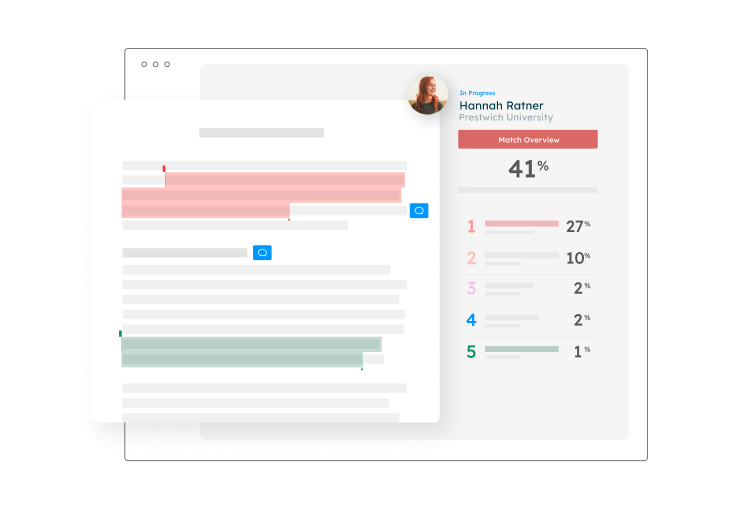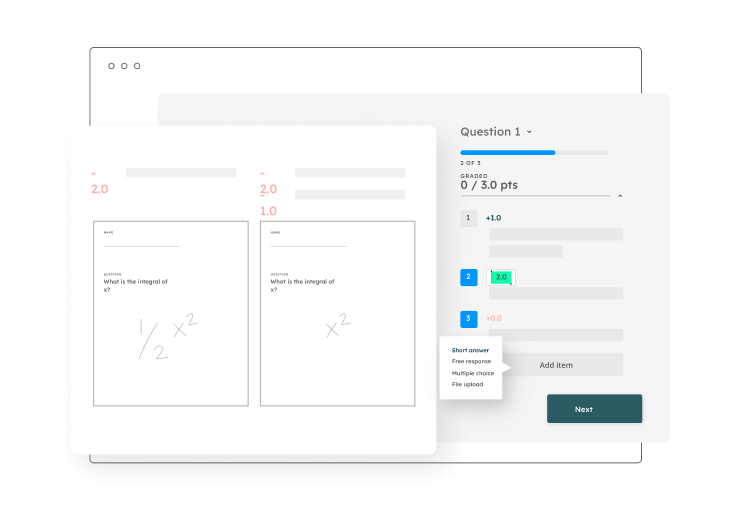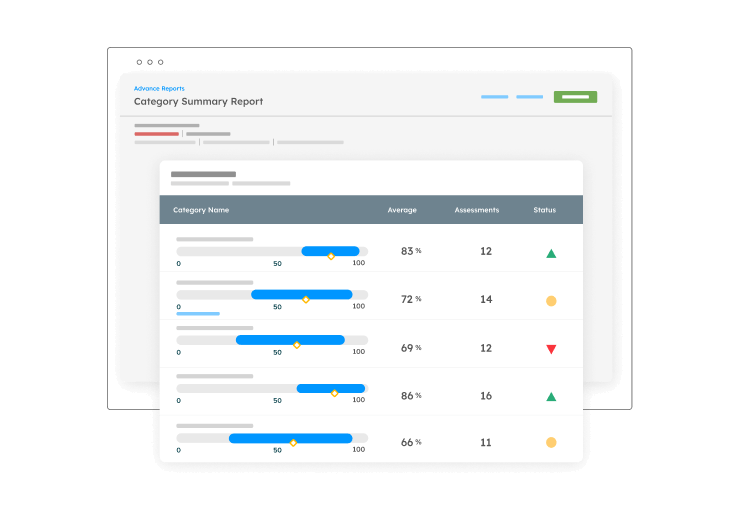Ensure accurate, meaningful assessment and grading
Harness flexible course assessment solutions to meet the diverse needs of students and educators and transform grading into learning.
Why accurate, authentic assessment matters
Effective assessment sits at the intersection of learning and achievement, ensuring every student is equipped to succeed.
- Measures student mastery of skills or knowledge gaps.
- Guides learning progress across the journey to scaffold learners.
- Ensures fair and reliable evaluation to validate outcomes and credentials.
- Informs teaching strategies and course improvements through assessment data.
Modernizing course assessment and grading for student success
Educators are seeking support as digital and AI integration, along with student equity and accessibility, place new demands on student assessment.
Deliver high-quality, flexible assessment
Assess learning your way by building, administering, and grading paper-based, bubble sheet, and digital assignments, whether in-person, online, or hybrid.

Safeguard academic integrity
Overcome challenges in verifying authentic work that can jeopardize credentials through academic integrity mechanisms in the grading workflow.

Accelerate grading and feedback
Reduce grading fatigue and increase fairness with streamlined, AI-powered workflows that increase feedback quality, consistency, and cut grading time in half.

Measure student learning trends
Track and analyze student progress at an individual and aggregate level to inform instruction and support strategic initiatives throughout your institution.

Unlocking solutions for success with Turnitin
From education to research and publishing, Turnitin helps organizations safeguard quality, enhance workflows, and foster innovation.

Turnitin Feedback Studio safeguards institutional reputation and streamlines feedback and grading workflows that lead to student success in writing and beyond. Time-saving formative feedback and grading tools deter plagiarism, help students cultivate writing excellence, and build critical thinking skills that drive career readiness. Assess your way with flexible add-on capabilities including Paper to Digital; supporting paper-based assignments with digital grading workflows, Turnitin Originality; addressing emerging misconduct threats, and Turnitin Clarity; bringing transparency to the writing process in the age of AI.


Gradescope is a paper-to-digital platform that dramatically improves instructors' grading and feedback workflows, offers flexible assessment solutions, and provides actionable insights. Deliver high-quality assessment at scale, faster and more consistent grading for fairer, inclusive assessment, and view student learning trends in real time. Gradescope enables digital grading workflows for paper-based assessment while integrating AI-assisted grading and systematic answer grouping to eliminate redundant steps from the grading process.


Used by over 2,400 programs across the globe, ExamSoft is the most secure, offline digital assessment platform. It ensures exam integrity, supports accreditation efforts, and provides real-time insights that elevate student success. With flexible exam creation, customizable reporting, and the highest level of security, institutions can confidently manage high-stakes assessment and enhance curricular outcomes.

Ready to talk? Chat with an expert.
Schedule a callDiscover a suite of solutions that empower the education community

Students
Ensure students develop original thinking skills, feel empowered to take the next steps in their learning journey, and earn their grades and credentials with honesty.

Instructors
Provide actionable, meaningful feedback to learners in less time and with greater consistency and fairness, while gaining confidence in the authenticity of student work.

Administrators
Access secure data insights and reporting to improve course and student performance, and uphold academic standards across your institution amid developments such as generative AI.

Institutions
Preserve reputation, differentiate and scale course offerings, and inform curriculum and assessment strategies to elevate teaching and learning outcomes.
Scalability for growing institutional needs
Turnitin solutions seamlessly integrate with a wide array of third-party platforms and systems, enabling custom workflows for organizations of all sizes. Leveraging a robust global cloud infrastructure, we ensure secure, high-standard data processing that can easily scale to meet the evolving needs of our customers.
Trusted by leading institutions worldwide
“My first exam, as soon as I tried it, I saw huge grading efficiency. We split out problems for myself and the group to grade [and] I could see everything in the system. We also noticed we were more consistent grading particular questions”
Jenny Amos, Teaching Professor, Bioengineering, University of Illinois: Urbana-Champaign
Course assessment FAQs
Collapse all
What is changing in assessment practices?
Student-centred learning and authentic course assessment are taking centre stage in today’s education landscape, with a greater emphasis on applied skills and competencies. Combined with the dual risks and opportunities presented by technologies such AI and their implications on proof of learning, it’s clear that instructors need deeper insights and tools to help evaluate student work. With DEI also top of mind, educators need ways to deliver immediate, effective feedback tailored to individual students and scaled across class sizes, to ensure student engagement and retention.
What is the difference between formative and summative assessment?
Summative assessments are typically “high-stakes” and used to measure student achievement at specific points in time to determine overall mastery of content. Formative assessments, on the other hand, are designed to monitor progress along the way and provide immediate feedback that informs instruction and learning and encourages students to course-correct after setbacks. More frequent formative assessment presents an opportunity to scaffold student growth, and specialized grading software can support this strategy.
What is the importance of academic integrity in course assessment?
Without academic integrity underpinning assessment, it risks losing its value as true measures of student learning. This risks unfair advantages and erosion of trust in the credential an institution confers. Especially at a time when generative AI use is blurring students’ own output, it is imperative that educators have confidence in the authenticity of student work. Building a culture of academic integrity and embedding integrity measures into assessment practices can ensure assessments remain reflective of each student's genuine capabilities.
How can grading software help me grade more effectively and efficiently?
Evolving expectations in assessment and the pressure to do more in less time are outpacing manual grading methods. Educators are seeking assistance to reduce workloads and gain time back to teach. For instance, reusable comments and AI-assisted answer grouping in grading software can scale and increase consistency, while blind or anonymous grading can reduce grading bias. Technology is never a substitute for educator intuition, but the two can work hand in hand to elevate the provision of timely, personalized grading and feedback.
How can assessment data help me identify areas for student improvement?
By harnessing assessment data of student performance, educators can ascertain mastery or pinpoint gaps that need attention among individuals or cohorts. This data must be accessible and actionable in order to yield targeted interventions, personalised support, and adjustments to teaching approaches or curriculums. Turnitin’s detailed analytics and item-level statistics help instructors get a clear picture of student performance and address potential roadblocks in real-time, along with aggregate data for department-level metrics and to inform decision-making.
What makes Turnitin different from other grading software for instructors?
Turnitin’s assessment suite provides a flexible, unmatched array of tools and integrations that are time-tested and incorporate evolving educator and student needs. Over 16,000 institutions globally entrust Turnitin to support a variety of assignment and assessment types, typically yielding a 50% reduction in grading time. We invest in AI functionality to accelerate grading at scale and enable instructors to engage more with students, with research demonstrating that Turnitin’s grading software supports ‘where to next?’ feedback that leads to enhanced student performance over time.
Can Turnitin support both paper and digital assessment methods?
Despite the advantages of digital methods, paper-based assessment continues to play a key role in many courses, offering unique benefits around familiarity, accessibility, and perceived reliability. However, it is often accompanied by significant logistical and administrative challenges. By harnessing Turnitin features such as automatic roster matching and optical character recognition (OCR), educators can bridge the gap between traditional and digital assessment methods to create a more robust, efficient, and equitable assessment and grading process.
How does Turnitin ensure the security of my data?
Turnitin prioritizes the security of your academic data by implementing robust protective measures. Data is stored in highly secure regional data centers, ensuring compliance with local data privacy regulations, and additional security features safeguard your information throughout the process. With stringent privacy and protection policies, Turnitin ensures that academic data is handled with the utmost care, providing administrators, instructors, and students with the confidence that their work is secure and safe from risk.




